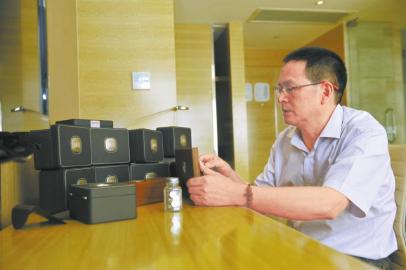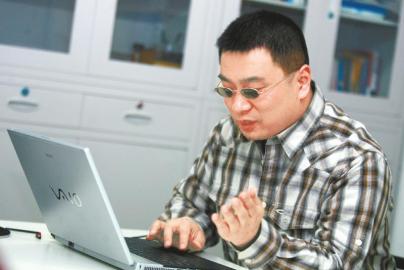The reporter talked with Ye Guang and Wang Hai, the first batch of professional counterfeiters in China.

Ye guang
Wang hai
Revealing the public welfare and business follow-up of professional counterfeiters under the strictest Food Safety Law
Shopping in the supermarket, not for shopping, staring straight at the packaging of goods; If you buy a commodity, you don’t have to eat it, in order to ask for ten times compensation. On the 21st, Huaxi Dushi Bao reported the "counterfeiting" drama staged by Chengdu professional counterfeiter Yang Hai (pseudonym) in a large supermarket in Chengdu High-tech Zone, which attracted attention.
Relevant regulations make it clear that "knowing and buying fakes" is protected by law, and "professional counterfeiters" can defend their rights according to law. The high compensation and reporting system such as the new consumer law and the new food safety law also indirectly brings "dividends" to professional counterfeiting. However, the growing number of professional counterfeiters is becoming more and more mixed. In many "fights", in addition to being supervised, merchants have also heard threats, been harassed by telephone, and some have compromised because they can’t afford it.
Ye Guang and Wang Hai have the most say in professional counterfeiting. They are the first batch of professional counterfeiters in China after the implementation of the "old consumer law" in 1994. On the 21st, these two well-known counterfeiters talked to reporters about their industries. Apart from being happy that professional counterfeiters are welcoming the spring, they are also disgusted with some unethical counterfeiters.
Businessmen complain
Can businesses really afford to encounter professional counterfeiters?
Recently, Ms. Tan, the head of a large supermarket in Chengdu, often went to the local food and drug administration to submit materials such as supermarket ledgers, videos and manufacturer’s certificates … because her supermarket "spread" professional counterfeiters.
The claim was rejected, and the counterfeiter said malicious words.
On October 5, Mr. Zeng, a professional counterfeiter, came to the supermarket and bought two bottles of seasonings and five cans of coffee beans. Just after closing the account, he found the supermarket with the goods and demanded compensation of more than 6,000 yuan on the grounds that the seasoning expired and the coffee beans were marked with false production dates.
Because the request for compensation on the spot was rejected, Mr. Zeng went to the supermarket many times. "He said that he still hid a lot of things. If we don’t pay this time, we will continue to sue us later." Ms. Tan said.
Complaining and suing businesses can’t afford it.
This is not the first time that Ms. Tan has "fought" with professional counterfeiters. In March, 2013, a professional counterfeiter seized a candy sold in a supermarket, demanded compensation, and took the supermarket to court.
Ms. Tan said that the candy manufacturer is an enterprise in Shanghai. In order to go to court, I came to Chengdu from Shanghai twice. However, the plaintiff did not attend the two sessions. "After that, they called and said that they would sue us in five months."
About a year later, things just went away. "Merchants and manufacturers don’t have so much time to spend with these professional counterfeiters, and some may compromise and spend money to eliminate disasters." Ms. Tan said that these professional counterfeiters usually ask for compensation first. After the compensation is fruitless, they directly complain to the Food and Drug Administration. If the complaint is successful, they will take the penalty notice and go to court to sue in order to get more compensation.
All kinds of harassment are as short as half a month and as long as a year.
Mr. Niu, the head of another supermarket, also felt the same way about the situation that Ms. Tan’s supermarket was "harassed" for one year. For many years, he has met many professional counterfeiters. "I’m used to it. Who hasn’t met (professional counterfeiters) in our industry?"
Mr. Niu said that due to technical reasons, some production dates are indeed somewhat vague. "For example, if’ 3′ looks like’ 8′, they will hold on to it and demand compensation."
Mr. Niu said that he had met such professional counterfeiters. They applied for a Weibo account and posted all kinds of "rights protection information" on the Internet. "They will continue to @ us and relevant departments, trying to make things bigger and forcing us to compromise under pressure."
In addition to merchants, more than two months ago, Mr. Liu, the relevant person in charge of a condiment production enterprise in Chengdu, received a phone call from a professional counterfeiter. "I call every day for at least half a month, and I really don’t bother."
Dialogue counterfeiters
After the implementation of the "old consumer law" in 1994, Ye Guang and Wang Hai were the first professional counterfeiters in China. They were once regarded as "plague gods" by countless fake merchants, and also regarded as fake fighters by many consumers, and later called "Nanyeguang and Beihaiwai". On the 21st, the reporter contacted two well-known counterfeiters in the North and South.
Ye Guang: The industry is mixed.
Even Tibetan food has expired at the top of the shelf.
Last year, the new consumer protection law was officially implemented, and Ye Guang asserted at that time: "The spring of professional counterfeiters has arrived."
As he said, since last year, more and more people have joined the professional anti-counterfeiting team. "But I have to admit that our line can’t be standardized, and the counterfeiters are also mixed." Ye Guang said that not long ago, he got a set of data: there are about 1,000 professional counterfeiters in Beijing. In Chongqing, there are also more than 100 people. He visited the courts in several districts in Chongqing and found that one or two civil lawsuits for rights protection are cases of professional counterfeiters every day. "I can know the names on the court announcement at a glance."
Ye Guang said that to be a professional counterfeiter, the basic requirement is to be familiar with some laws and regulations, but some newcomers, some of whom don’t even know the law, are prone to excessive rights protection, that is, "the lion opens his mouth". "I hope they can study the law thoroughly. Since they want to be woodpeckers, I hope they can sharpen their mouths."
Not long ago, Ye Guang was deeply touched by an incident. A professional counterfeiter hid the food in the hidden place on the top of the shelf in the supermarket, calculated that the shelf life had passed, and returned to the supermarket to buy the food, and then defended his rights.
"We despise this kind of behavior." Ye Guang said.
Wang Hai: Stick to the moral bottom line and don’t touch the legal red line.
Counterfeiting is worth encouraging.
Wang Hai, known as "the first person to crack down on counterfeiting in China". On the 21st, in an interview with Huaxi Dushi Bao, he said: "It is gratifying to see more and more people being called professional counterfeiters."
Wang Hai believes that in the case of limited administrative resources, encouraging consumers to participate in the supervision of product quality does not cost taxpayers a penny, but also increases the illegal costs of producers and sellers, which is absolutely beneficial to reshaping "Made in China". "Wang Hai said that as long as counterfeiting is not illegal, it objectively encourages manufacturers and sellers not to make and sell fakes. He feels that it is worth encouraging. He summed it up as four basic principles: "legitimacy, necessity, rationality and legitimacy". "You don’t dare to make fake sales, so naturally there will be no professional counterfeiters like us."
At the same time, Wang Hai also admitted that professional counterfeiters, like all industries, have people who violate the moral bottom line and those who touch the legal red line. He even heard that in order to find the problem, some people deliberately put off the food they bought, then took it into the supermarket to pretend that they had just bought it, and then defended their rights. "I think this kind of person is morally wrong."
As a professional counterfeiter, Wang Hai has 20 years of experience in counterfeiting. During these years, he has dealt with many industrial and commercial administrators and law enforcement officers of the Food and Drug Administration. "In the past, we were all opposites, and now the concept of many law enforcement officers has changed." Wang Hai said that looking back at the 20 years of professional counterfeiters, without them, fake and shoddy goods would only be more rampant.
Netizen voice
Although the relevant regulations make it clear that "knowing and buying fakes" is protected by law and "professional counterfeiters" can protect their rights according to law, readers also have different views on this "profession". After the report of professional counterfeiters was launched in Huaxi Dushi Bao, it caused a heated discussion among readers, and the comments were divided into two factions.
Pro-faction
Lunar New Year: The objective effect is conducive to safeguarding the interests of consumers and should be supported.
Renlaikuang: Actually, it’s quite good. Although it may not be immediate at this stage, if there are more and more such people, the counterfeiters will be unable to afford it in terms of cost, and fewer and fewer people will eventually sell fakes.
The opposition
Rabbit sauce sauce _: I really don’t like these professional counterfeiters, and they make money by taking advantage of legal loopholes.
Sven: The spirit of counterfeiting is admirable! But to make a fortune by this means, it feels like blackmailing counterfeiters, instead of really doing justice, we all get what we need. (Reporter Wu Liufeng, Wu Bingqing)
关于作者